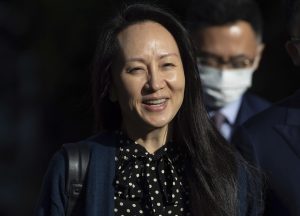Meng Wanzhou, a top executive of Chinese communications giant Huawei Technologies, has resolved criminal charges against her as part of a deal with the U.S. Justice Department. That could pave the way for her to return to China and concludes a case that roiled relations between Washington and Beijing, as well as between Canada and China.
The deal with Meng, Huawei’s chief financial officer and the daughter of the company’s founder, was disclosed in federal court in Brooklyn on Friday. It calls for the Justice Department to dismiss the case next December, or four years after her arrest, if she complies with certain conditions.
The deal, known as a deferred prosecution agreement, resolves a years-long legal and geopolitical tussle that involved not only the United States and China but also Canada, where Meng has remained since her arrest there in December 2018. Meng appeared via videoconference at Friday’s hearing.
The deal was reached as President Joe Biden and Chinese counterpart Xi Jinping have sought to minimize signs of public tension — even as the world’s two dominant economies are at odds on issues as diverse as cybersecurity, climate change, human rights and trade and tariffs.
A spokesperson for Huawei declined to comment, and a spokesman for the Justice Department in Washington did not respond to an email seeking comment.
Under then-President Donald Trump, the Justice Department unsealed criminal charges in 2019, just before a crucial two-day round of trade talks between the U.S. and China, that accused Huawei of stealing trade secrets. The charges also alleged that Meng had committed fraud by misleading banks about the company’s business dealings in Iran.
The indictment accuses Huawei of using a Hong Kong shell company called Skycom to sell equipment to Iran in violation of U.S. sanctions.
Meng, the daughter of Huawei’s founder, Ren Zhengfei, was arrested in Vancouver for extradition to the United States. For the last three years, she has fought the Justice Department’s extradition request, and her lawyers called the case against her flawed. Last month, a Canadian judge didn’t rule on whether Meng should be extradited to the United States after a Canadian Justice Department lawyer wrapped up his case saying there was enough evidence to show Meng was dishonest and deserved to stand trial in the U.S.
The case caused major frictions between Canada and China, with Beijing blasting Meng’s arrest as politically motivated and demanding she be released. Soon after Meng was arrested, China detained two Canadians, Michael Spavor and Michael Kovrig. Chinese authorities later charged them with espionage in what has been widely seen as a form of “hostage diplomacy” meant to pressure Ottawa into releasing Meng. Spavor was sentenced to 11 years in prison in August; Kovrig has not yet been sentenced but his trial ended in March.
It’s unclear what Meng’s potential release would mean for Spavor and Kovrig, as China has always insisted the cases are unrelated. Canada, meanwhile, will expect both men to be returned home when Meng does.
Huawei is the biggest global supplier of network gear for phone and internet companies, and some analysts say Chinese companies have flouted international rules and norms amid allegations of technology theft. The company represents China’s progress in becoming a technological power and has been a subject of U.S. security and law enforcement concerns.
It has repeatedly denied the U.S. government’s allegations and the security concerns about its products.

































